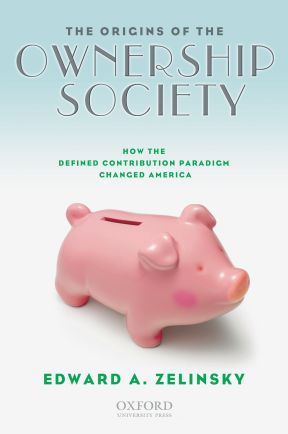
By Edward Zelinsky
Telecommuting benefits employers, employees, and society at large. Telecommuting expands work opportunities for the disabled, for those who live far from major metropolitan areas, and for the parents of young children who value the ability to work at home. Telecommuting also removes cars from our crowded highways and enables employers to hire from a wider and more diverse pool of potential employees.
It is thus anomalous that New York State’s personal income tax discourages interstate telecommuting by taxing the compensation non-resident telecommuters earn on the days such telecommuters work at their out-of-state homes. Under the misleading label “convenience of the employer,” New York subjects telecommuters to double income taxation by their state of residence as well as by New York – even though New York provides non-resident telecommuters with no public services on the days such interstate telecommuters work at their out-of-state homes outside of New York’s borders.
Some of New York’s elected officials profess interest in making New York tax policy more rational and family-friendly. These officials, however, have shown no willingness to repeal the “convenience of the employer” rule to stop New York’s double state income taxation. Taxing non-resident, non-voters for public services they do not use is just too politically tempting for Albany to resist.
Fortunately, federal officials have begun to recognize the unfairness and irrationality of the double state income taxation inflicted on non-residents by New York’s “convenience of the employer” rule. Most recently, US Representative Jim Himes, joined by his House colleagues Elizabeth Esty and Rosa DeLauro, introduced H.R. 4085, The Multi-State Worker Tax Fairness Act of 2014.
Representative Himes, and his colleagues, are to be commended for introducing this much needed legislation. If enacted into law, H.R. 4085 would make the tax system safe for interstate telecommuting.

In previous incarnations, legislation along these lines was denominated as The Telecommuter Tax Fairness Act. The legislation’s goal remains the same. For Congress, using its authority under the commerce clause of the US Constitution, to forbid New York and other states from double taxing no-nresidents’ incomes on the days such non-residents work at their out-of-state homes.
Consider in this context the spate of service stoppages experienced by MetroNorth railroad commuters this winter. During these stoppages, public officials quite sensibly urged MetroNorth commuters to work from home rather than clog the already crowded highways to reach Manhattan. However, no public official spoke candidly about the tax penalty such commuters triggered by working at their Connecticut homes.
New York’s double taxation of non-resident telecommuters is not limited to those who live and work at home in the northeast. Under the banner of employer convenience, New York projects its taxing authority throughout the nation. In widely reported cases, New York imposed its personal income tax on Thomas L. Huckaby for days he worked at his home in Tennessee, on Manohar Kakar for days he worked at his home in Arizona, and on R. Michael Holt for days he worked at his home in Florida.
Nor is the threat of double taxation limited to New York’s personal income taxes imposed on non-resident telecommuters. Fortunately, many states recognize that double taxing non-resident telecommuters is ultimately self-destructive, driving telecommuters and the firms which employ them to states with more welcoming tax policies. However, other states emulate the Empire State’s tax hostility to interstate telecommuting. For example, Delaware taxed Dorothy A. Flynn’s income for the days she worked at her Pennsylvania home, even though Ms. Flynn did not set foot in Delaware on these work-at-home days.
The unfairness and inefficiency of the double state income taxation of interstate telecommuters has led a broad national coalition to favor federal legislation like H.R. 4085. Among those supporting such legislation are the American Legion, the Christopher and Dana Reeve Foundation, the National Taxpayers Union, The Small Business & Entrepreneurship Council, the Association for Commuter Transportation, The Military Spouse JD Network, and the Telework Coalition.
Representative Himes, along with Representatives Esty and DeLauro, are to be commended for introducing H.R. 4085. If enacted into law, this much needed legislation would make the tax system safe for interstate telecommuting by forbidding double state income taxation of non-resident telecommuters.
 Edward A. Zelinsky is the Morris and Annie Trachman Professor of Law at the Benjamin N. Cardozo School of Law of Yeshiva University. He is the author of The Origins of the Ownership Society: How The Defined Contribution Paradigm Changed America. His monthly column appears on the OUPblog.
Edward A. Zelinsky is the Morris and Annie Trachman Professor of Law at the Benjamin N. Cardozo School of Law of Yeshiva University. He is the author of The Origins of the Ownership Society: How The Defined Contribution Paradigm Changed America. His monthly column appears on the OUPblog.
Subscribe to the OUPblog via email or RSS.
Subscribe to only law articles on the OUPblog via email or RSS.
Image credit: Metro-North EMD FL9 leaving Stamford, CT. Public domain via Wikimedia Commons.
The post Make the tax system safe for interstate telecommuting: pass H.R. 4085 appeared first on OUPblog.


By Edward Zelinsky
In a unanimous decision, New York’s Court of Appeals, the Empire State’s highest court, recently held that John Gaied was not a New York resident for income tax purposes because he had no New York home.
Mr. Gaied was domiciled in New Jersey and had a business on Staten Island to which he commuted daily. He purchased a multi-family apartment building near his business in New York, both as an investment and to house his parents who lived in the building’s first floor apartment.
New York’s tax commissioner claimed that this Staten Island building made Mr. Gaied a New York resident for tax purposes. The New York Tax Appeals Tribunal and the New York Appellate Division affirmed the commissioner’s determination that this building constituted Mr. Gaied’s “permanent place of abode” in New York – even though Mr. Gaied personally did not lived there.
The good news is that Mr. Gaied ultimately prevailed. The bad news is that he had to fight his way to New York’s highest court to prevail. As that court held, “in order for a taxpayer to have maintained a permanent place of abode in New York, the taxpayer must, himself, have a residential interest in the property.” Since it was Mr. Gaied’s parents who lived in the first floor apartment, not Mr. Gaied himself, he was not a New York resident for tax purposes.

Mr. Gaied’s lawyer, Timothy P. Noonan of Hodgson Russ, LLP, is entitled to be proud of this victory for tax sanity in New York. The problem is that such sanity is all too rare. Mr. Gaied had to go to New York’s highest court to establish the common sense proposition that a “place of abode” is a location at which the taxpayer actually lives.
Unfortunately, the kind of irrationality manifested by New York’s tax commissioner in Gaied is endemic to New York’s tax system. Consider, for example, New York’s insistence that the modest beach house owned and used by Mr. John J. Barker for a handful of vacation days each year transforms Mr. Barker into a New York resident, even though his permanent home is in Connecticut. Or consider New York’s “convenience of the employer” doctrine under which New York taxes the income earned by nonresident telecommuters on the days such telecommuters work at their out-of-state homes and don’t set foot in the Empire State. There is much that is irrational and self-destructive in New York tax policy.
Governor Cuomo has eloquently proclaimed that New York can no longer be “the tax capital” of the United States. The Governor is right. Hopefully, Gaied will signal to New York’s policymakers the need to reform New York’s self-destructive approach to personal income taxation. Repairing New York’s definition of residence and abolishing the “convenience of the employer” doctrine would be good places to start.
 Edward A. Zelinsky is the Morris and Annie Trachman Professor of Law at the Benjamin N. Cardozo School of Law of Yeshiva University. He is the author of The Origins of the Ownership Society: How The Defined Contribution Paradigm Changed America. His monthly column appears on the OUPblog.
Edward A. Zelinsky is the Morris and Annie Trachman Professor of Law at the Benjamin N. Cardozo School of Law of Yeshiva University. He is the author of The Origins of the Ownership Society: How The Defined Contribution Paradigm Changed America. His monthly column appears on the OUPblog.
Subscribe to the OUPblog via email or RSS.
Subscribe to only law articles on the OUPblog via email or RSS.
Image credit: A section of the New York City. © diane39 via iStockphoto.
The post The Gaied Decision: a rare victory for tax sanity in New York appeared first on OUPblog.

Edward A. Zelinsky is the Morris and Annie Trachman Professor of Law at the Benjamin N. Cardozo School of Law of Yeshiva University. He is the author of The Origins of the Ownership Society: How The Defined Contribution Paradigm Changed America. In this article, Professor Zelinsky criticizes New York’s “convenience of the employer” doctrine for double taxing telecommuters at a time when public policy should be encouraging, rather than hindering, telecommuting. He calls on Congress to pass the Telecommuter Tax Fairness Act to stop such double taxation. Read his past OUPblog posts here.
A gallon of gas today costs $4.00 or more in most parts of the country. The public is concerned, as perhaps never before, about the impact of human activity on the global environment. In this setting, telecommuting has emerged as an environmentally sensitive and economically sensible lifestyle.
By permitting individuals to work at home for part (often much) of the work week, telecommuting removes telecommuters’ cars from the roads, thereby reducing traffic congestion, gas consumption, and automotive pollution. Telecommuting from home also opens job opportunities for persons for whom a conventional, daily trip to the work place is difficult or undesirable – parents’ of small children, disabled individuals, persons who live far from major employment centers. Telecommuting allows employers to hire these individuals who might otherwise withdraw from the labor force.
of the work week, telecommuting removes telecommuters’ cars from the roads, thereby reducing traffic congestion, gas consumption, and automotive pollution. Telecommuting from home also opens job opportunities for persons for whom a conventional, daily trip to the work place is difficult or undesirable – parents’ of small children, disabled individuals, persons who live far from major employment centers. Telecommuting allows employers to hire these individuals who might otherwise withdraw from the labor force.
For all of these reasons, public policy should encourage, or at least not hinder, the growth of telecommuting. Unfortunately, the tax policies of the State of New York discourage telecommuting by double taxing out-of-state individuals who telecommute for New York employers from their out-of-state homes. In particular, New York’s so-called “convenience of the employer” rule imposes nonresident New York income taxes on out-of-state telecommuters on the days they work at home, often hundreds – if not thousands – of miles from New York.
Consider, for example, the recent case of Mr. R. Michael Holt, a human resources compensation consultant who lives in Naples, Florida. In 1999, Mr. Holt worked at his home in Florida for the New York offices of KPMG, LLP and William M. Mercer, Inc. Under the employer convenience rule, New York imposed nonresident income taxes upon Mr. Holt for the income he earned working at home in the Sunshine State, thousands of miles from New York.
When the state in which a telecommuter lives also imposes an income tax, the result of New York’s tax policy is double taxation as the out-of-state telecommuter who works at home must pay tax both to New York and to the state in which she lives. The result is an unfair and inefficient tax penalty for telecommuting, namely, the double taxation of the income earned by the telecommuter on the days she works at her out-of-state home.
New York’s policy is bad, not only for out-of-state persons who telecommute to the Empire State, but potentially for telecommuters throughout the nation and for the employers who employ such telecommuters. If New York can get away with double taxing out-of-state telecommuters, other states will be tempted to emulate New York and likewise tax nonresident telecommuters who work at their out-of-state homes. The upshot will thus be double taxation of telecommuters nationwide when public policy should instead be supporting telecommuting.
Unfortunately, New York’s courts have refused to stop New York’s double taxation of nonresident telecommuters on the days such telecommuters work at their out-of-state homes. In Huckaby v. Tax Appeals Tribunal, New York’s highest court, by a narrow but decisive margin of 4-3, upheld New York’s income taxation of Thomas Huckaby on the days Mr. Huckaby worked at his home in Nashville, Tennessee.
Pending in Congress is legislation which would prevent New York and other states from using the “convenience of the employer” doctrine or any similar artifice to double tax nonresident telecommuters on the days they work at their out-of-state homes. The Telecommuter Tax Fairness Act has attracted bi-partisan support from members of Congress who recognize the importance of telecommuting-friendly public policy.
It is unreasonable for New York to punish telecommuting by double taxing workers who telecommute for New York employers from their out-of-state homes, particularly at a time when sound public policy should encourage telecommuting. There is, however, no sign that New York will alter its irrational “convenience of the employer” rule. Congress should accordingly adopt the Telecommuter Tax Fairness Act to eliminate the ability of New York and other states to double tax nonresident telecommuters on the days they work at their out-of-state homes.
ShareThis

By Kirsty OUP-UK
A very Happy New Year to you all from OUP-UK. My maiden post for 2008 is the latest in the Very Short Introductions column. This month Joseph Dan, author of Kabbalah: A Very Short Introduction, has kindly answered some questions for me. Joseph Dan is a renowned expert on Kabbalah, and is the Gershom Scholem Professor of Kabbalah in the Department of Jewish Thought at the Hebrew University of Jerusalem. His many books include The Heart and the Fountain: Jewish Mystical Experiences, The Early Kabbalah, and The Teachings of Hasidism. He resides in Jerusalem and in Cambridge, Massachusetts, where he is a visiting professor at the Harvard Divinity School.
(more…)
Share This


Edward A. Zelinsky is the Morris and Annie Trachman Professor of Law at the Benjamin N. Cardozo School of Law of Yeshiva University. He is the author of The Origins of the Ownership Society: How The Defined Contribution Paradigm Changed America. His monthly column appears on the OUPblog.





